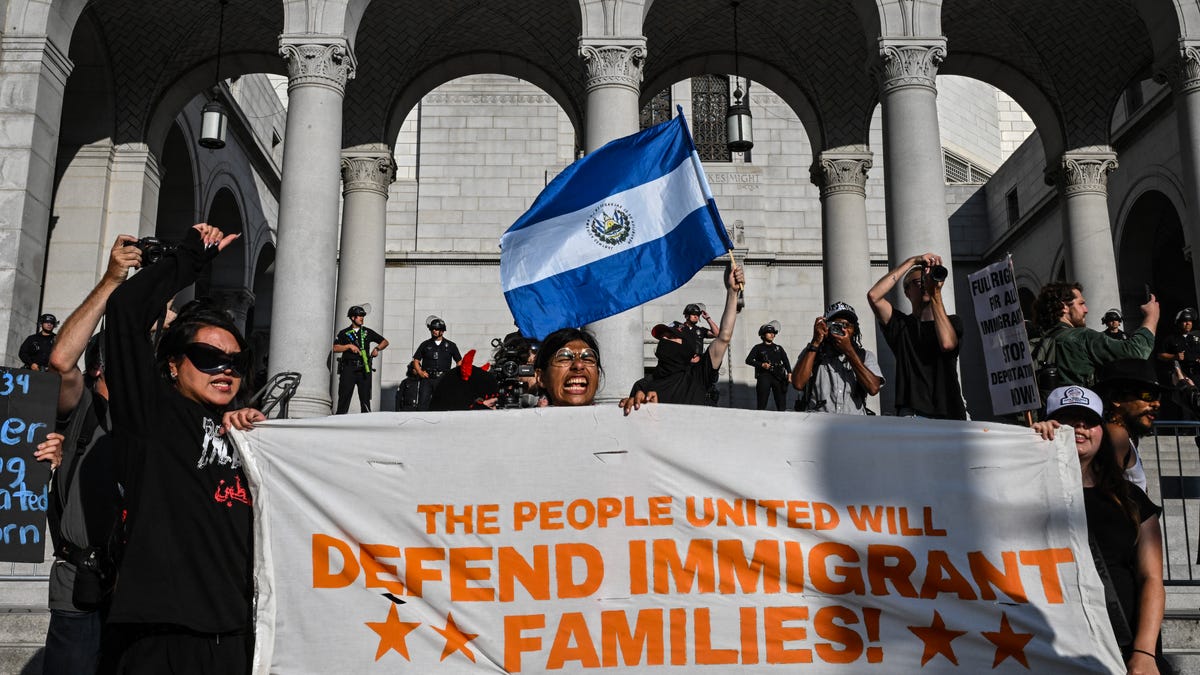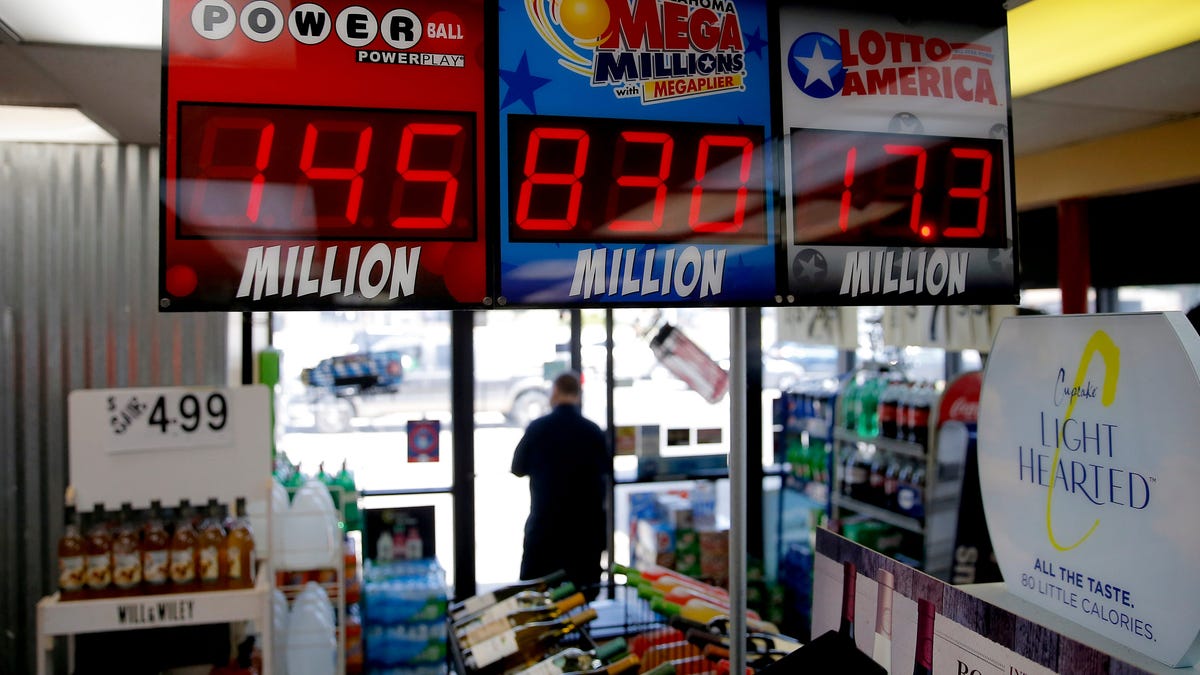National Guard major general clarifies military’s role in Los Angeles
National Guard Major General Scott Sherman outlined the role of military personnel in Los Angeles and said troops will not conduct arrests.
President Donald Trump’s administration is stepping up deportation efforts in California with immigration raids at restaurants, traffic stops and routine legal check-ins.
The immigration crackdown, while popular with voters in polls, has sparked protests in Los Angeles. Long term, economists warn that fewer immigrants could take a hit to the economy, prompting labor shortages and slowing economic growth.
“Immigrants play a huge role in the California economy,” said Giovanni Peri, an economics professor at the University of California, Davis. Without immigrants, “there will be less economic growth. Less opportunity, also, for local companies and American workers.”
Why the U.S. is ‘immigrant dependent’
The country’s economy has become “very immigrant dependent,” according to Christopher Thornberg, founding partner at Beacon Economics, a Los Angeles research and consulting firm.
About 479,000 U.S.-born workers were added to the labor force over the last five years compared with 3.6 million foreign-born workers, according to an October report from the National Foundation for American Policy, a nonpartisan research organization. The report pointed to a spike in immigration and retirements, coupled with a slowdown in U.S.-born working-age population growth.
In California, immigrants make up roughly one-third of workers and comprise an outsized share of the workforce in physically intensive sectors like construction and agriculture.
Critics say these workers are lowering wages for American-born citizens or taking away jobs. But Peri said that doesn’t pan out in the data.
Immigrants may reduce wages for native-born Americans with competing skills, according to Harvard economics professor George Borjas, but it slightly increases the income of native-born citizens overall. A separate 2024 working paper co-authored by Peri found immigrants had no significant effect on wages for those born in the U.S. who are college educated and a positive effect on wages for their American-born peers who are less educated.
Instead, Peri said immigrants are filling the holes in industries struggling to hire.
Immigrants account for 28% of care workers in long-term care settings, according to the nonprofit health policy organization KFF. In California, immigrants make up 44% of manufacturing jobs and 40% of construction jobs, according to the Economic Policy Institute, a left-leaning think tank based in Washington D.C.
Some of those jobs are held by undocumented workers. About 1.8 million people, or 17% of immigrants in California, were undocumented as of 2022, according to Pew. The vast majority – 1.4 million – had no legal protections through programs like Deferred Action for Childhood Arrivals or active asylum claims.
“It would be lovely to deal with this with an expansion of the legal immigration system,” Peri said. “But lacking that, undocumented immigrants are doing a lot of these jobs. And losing some of them would make the situation worse.”
Pushing away immigrants, Peri argues, prevents companies from growing and creating more jobs that would benefit U.S.-born workers. One 2024 analysis from Jamshid Damooei, executive director of the Center for Economics of Social Issues at California Lutheran University, found work from undocumented employees created an additional 1.25 million jobs in California.
And because the vast majority of undocumented immigrants are not criminals, but people who have been part of their local communities for years if not decades, “in the majority of cases, the effects of just indiscriminately deporting these people is going to have very little benefit for the American people,” Peri said.
Revenue vs. cost
It’s true that immigrants add costs for the government; they benefit from public education, health services and other state-specific policies.
But research generally finds immigration tends to raise the federal government’s revenue more than its costs, with immigrants adding an estimated $1.2 trillion in federal revenues between 2024 and 2034, according to the Congressional Budget Office. State and local governments’ costs tend to increase more than their revenues from a surge in immigration, but Peri said the rise in immigration is a net benefit overall.
Even undocumented workers, Peri argued, boost the government’s coffers because they pay a considerable amount of taxes. At the same time, they are ineligible for most federal benefits like Social Security and food stamps.
Undocumented immigrants contributed $8.5 billion in state and local taxes in 2022, according to a 2024 study from the Institute on Taxation and Economic Policy, a nonpartisan think tank.
What happens if the immigration crackdown continues?
Thornberg doesn’t expect Trump to deport every undocumented worker in the country, and views the crackdown in California as “more of a blown-up spectacle” that “may get tied up in the courts.”
Already, Trump has said he would back off certain deportation efforts to avoid labor shortages in areas like agriculture and hospitality.
“Our great Farmers and people in the Hotel and Leisure business have been stating that our very aggressive policy on immigration is taking very good, long time workers away from them, with those jobs being almost impossible to replace,” Trump said in a June 12 post on Truth Social. “Changes are coming!”
While an immediate labor shortage is unlikely, Thornberg believes we’re more likely to see people discouraged from coming to the U.S. in the years to come, resulting in a tighter labor market.
That could mean higher wages for workers as companies step up recruitment efforts, but it would slow economic growth overall.
Trump’s efforts to constrain immigration during his first term played out in a similar fashion; by 2019, the unemployment rate had dropped to 3.5%, its lowest level since 1969, with earnings up 3.5% from 2018. Meanwhile, economic growth slowed to 2.3%, down from 2.9% the year prior, according to the Bureau of Economic Analysis.
Peri said a tight labor market could have ripple effects across the economy, such as driving up the cost to produce certain items. Companies may be more inclined to import cheaper goods at a time when the Trump administration is pushing for more U.S. manufacturing through tariffs.
“This could have a cascade of effects,” he said. “There is no doubt at all that immigration and immigrants who do those simple, manual jobs are very important at making the economy go.”










